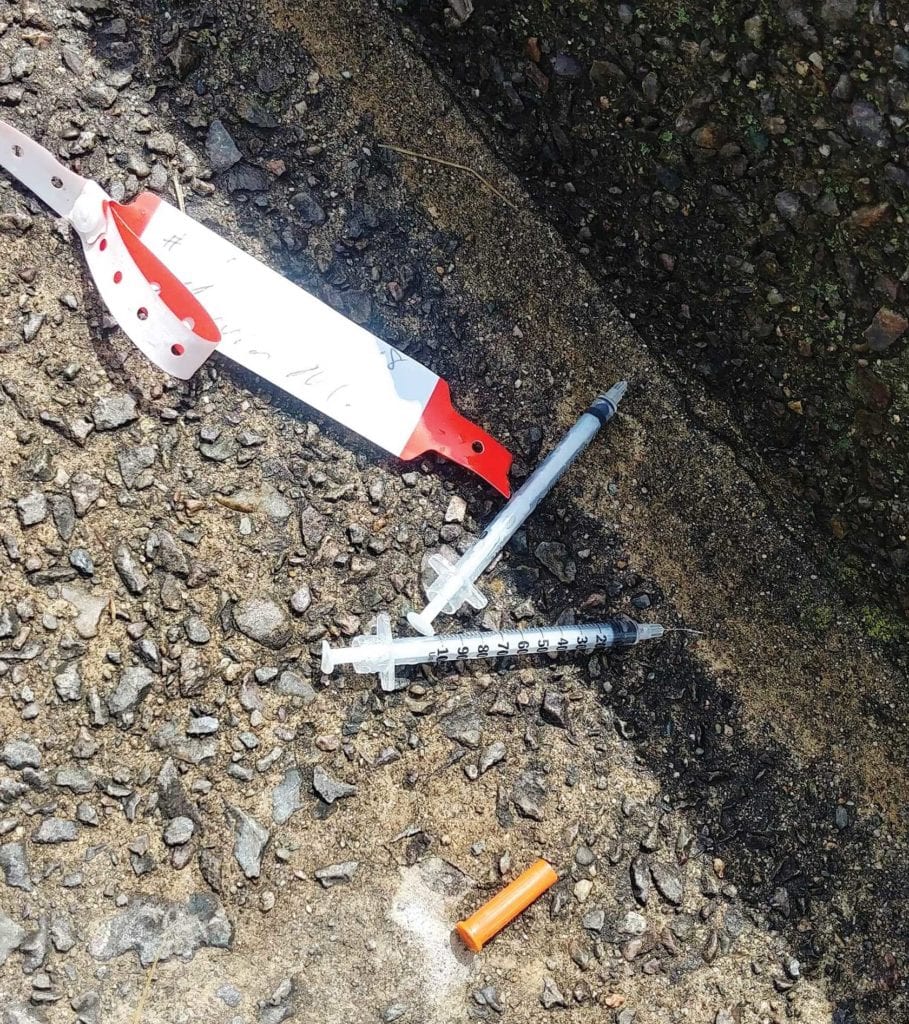Boston parks plagued by dirty needles
Signs of opioid drug epidemic spread beyond Mass. Ave.

Before the Boston Bengals’ new season starts, Coach Domingos DaRosa must regularly clear Roxbury’s Clifford Playground of the piles of discarded needles left behind by drug users camped out on the grass.

Drug paraphernalia, hospital bracelets and garbage litter Clifford Playground and the surrounding area. Photo by Leon Rivera
“It’s a biohazard dump,” said DaRosa, who has been in talks with city officials since April to ensure Clifford Playground, located at the corner of Massachusetts Avenue and Shirley Street, is clear of used hypodermic needles before the 5-to-15-year-old footballers can return to the field on Aug. 1.
These discussions, he said, are “like talking to a wall… they’re a disaster.”
The struggle to keep the playground, commonly referred to as Clifford Park, clear of syringes has been ongoing for more than a year, but DaRosa has noticed a sharp increase in the number of needles, drug users and homeless people in the area over the last 12 months.
“It’s worse than it was before,” said DaRosa. “They move in furniture and set up camp.” He regularly finds blankets and mattresses strewn with piles of 10 to 15 used needles and countless plastic orange caps.
Clifford Park is surrounded by drug treatment facilities, two homeless shelters and is less than a mile from Boston Medical Center. Its eastern edge skirts Massachusetts Avenue, otherwise known as “Methadone Mile.” This explains why the area attracts a high proportion of the city’s homeless population and those struggling with addiction.
But, DaRosa said, the problem extends beyond this epicenter and has moved into other parts of Roxbury, Dorchester, even as far south as Mattapan and Hyde Park.
“They’ve taken any corner, any space, any alley and infested it with feces, needles, clothes and blankets… it’s a zombieland,” said Leon Rivera, an active member of the “Needles In The Park” Facebook group.
Group members and those who post under the hashtag #heroininthepark, are community members who want to see the mayor’s office take stronger action in tackling this issue.
In response to a request for comment, a spokesperson from the Boston Public Health Commission emailed the Banner a list of initiatives funded by Mayor Martin J. Walsh’s office. These include a daytime engagement center for homeless people, now receiving permanent funding in the 2019 budget, the placement of a syringe disposal container in Clifford Park, and the establishment of a 311 non-emergency hotline.
“We’re doing all that we can, but we need to figure out a way to do more,” said City Councilor Annissa Essaibi-George.
An evolving issue
In 2017 the mayor committed to doubling the capacity of the city’s Mobile Sharps Team, responsible for collecting and safely disposing of discarded needles from Boston’s public spaces. The team now has four employees citywide.
Non-emergency calls placed with BOS:311, via phone, text, Twitter or their website, are handled by Constituent Service Center representatives. DaRosa said on a typical weekend he can wait up to four hours for a Mobile Sharps Team member to arrive.
Similarly frustrated with this system, Rivera, a former employee at U-Haul on Massachusetts Avenue who quit his job after witnessing a man overdose beside his rental unit, said that the 311 system does not effectively deal with the problem. Constantly sending requests feels futile, he said.
Essaibi-George described the Mobile Sharps Team as “unbelievably dedicated,” but, she added “we’re in the midst of a crisis, and this crisis is really taking a toll on active addicts and on the surrounding community.”
Rivera, who speaks to many of the drug users and homeless people he encounters, knows that an increasing number of them are not city residents.
“We’re taking all the heat,” he said.
With drug users flocking to Boston from surrounding towns and cities, including Plymouth, Quincy and Attleboro, to receive better health care and rehabilitation services, Essaibi-George said the city needs support from its neighbors to cope with the overwhelming burden currently placed on its resources.
While ambulance crews logged 3,557 narcotic-related transports to the city’s medical facilities in 2017, 29 percent were for patients who said they lived outside of Boston, according to Boston Emergency Medical Services statistics. This is a 58 percent rise in transports for non-Boston residents since 2016.
“There should be a regional plan,” said Essaibi-George. She would like to see one that requires full commitment to the application of therapeutic methods, and not just drug replacement treatments.
Community solutions
Similarly, Rivera called for a strategic plan that would involve input from the Boston Public Health Commission, the transit police, the Boston Inspectional Services Department and community outreach members from across the Commonwealth.
“Boston can do more,” said Rivera, “but we’re already exhausted.”
A regional coalition seems unlikely, given the opposition expressed by Quincy city councilors to plans involving the redevelopment of Long Island. Set to reopen in 2021, new facilities on the island would provide drug rehabilitation services and hundreds of beds for vulnerable people in and around Boston.
Rather than waiting to see if this plan succeeds, local residents are exploring their own solutions.
Rivera has launched a crowdfunded project to buy more syringe disposal boxes. Each unit costs about $113 and he hopes that, by placing them near sites where drug users are injecting, he can encourage them to discard used needles safely.
“We have ideas, the community has ideas, we’re just not being heard,” said Rivera.
Meanwhile, DaRosa hopes the park will be safe enough for the Bengals to get back to practice, and that the city will continue to support vulnerable members of society.
“It’s about keeping our doors open,” he said “and giving us a clean space that we can use with our families. That’s what just isn’t happening.”


![Banner [Virtual] Art Gallery](https://baystatebanner.com/wp-content/uploads/2024/04/Cagen-Luse_Men-at-store-e1713991226112-150x150.jpg)



